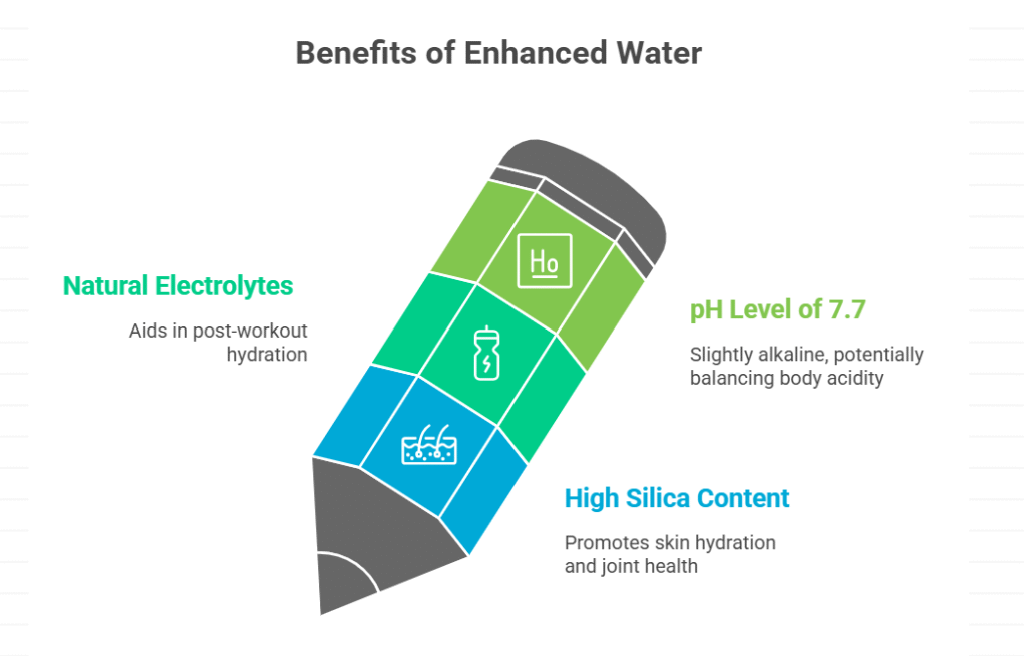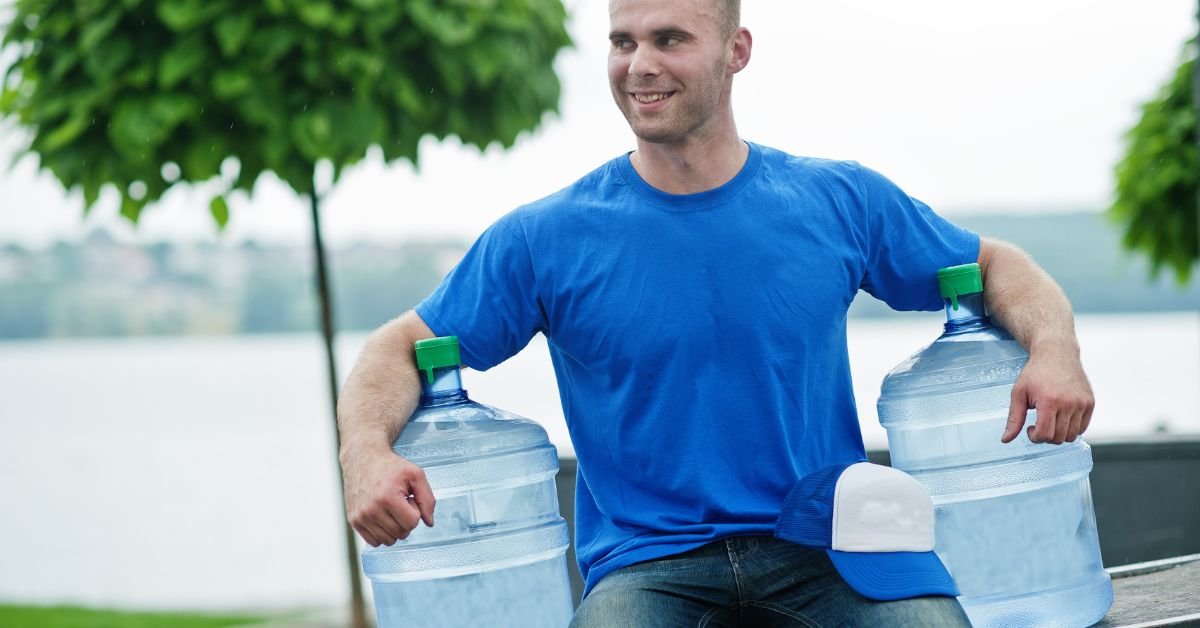Fiji Water is from the picturesque islands of Fiji, but let’s get real – it’s not just about the location; it’s about the marketing magic woven around it. The water is bottled at the company’s state-of-the-art facility in Sigatoka, where natural artesian water is collected from an underground source, filtered through volcanic rock, and enriched with natural electrolytes like silica. Sounds idyllic, doesn’t it?
But critics argue that Fiji Water’s “untouched by man” narrative glosses over the environmental impact of shipping thousands of liters of water across the globe. I mean, think about it – water bottled in the South Pacific, then transported thousands of miles by cargo ships and trucks. It’s a carbon footprint that’s anything but “pure.”
Ever wondered… if all that sustainability talk is just greenwashing? We’ll get to that. First, let’s talk health – because, at the end of the day, most of us care about what’s going into our bodies.
Is Fiji Water Good for You? The Science Explained
Now, onto the million-dollar question: is Fiji Water good for you? In short, yes – but not for the reasons you might think. Fiji Water boasts:
- High Silica Content: With 93% more silica than regular bottled water, it’s great for skin hydration and joint health. Dermatologists swear by it.
- Natural Electrolytes: Potassium, calcium, and magnesium are all present, making it a decent post-workout hydration option.
- pH Level of 7.7: Slightly alkaline, which some claim helps balance the body’s acidity (though experts debate this).
But here’s the catch: is Fiji Water good for you if you’re paying 5x the price of regular bottled water? Not everyone thinks so. Dr. Darin Ingels, a naturopathic doctor, once quipped, “Paying $5 for Fiji Water is like buying a designer handbag for your hydration – it’s more about the brand than the science.”
The real clincher? Fiji Water’s mineral profile isn’t dramatically different from other premium brands like Evian or San Pellegrino. So, is the premium price tag worth it? That’s for you to decide.

Real Talk from a Fitness Enthusiast:
“I used to shell out $40 a month for Fiji Water at the gym. Then I switched to a local alkaline brand for 1/3 the cost. Honestly, I couldn’t taste the difference. Now, I reserve Fiji for special occasions – it’s like drinking champagne instead of tap water.”
The Dark Side of Fiji Water: Environmental and Ethical Concerns
Let’s flip the script. Remember how Fiji Water touts its eco-friendly practices? Well, not everyone buys it. In 2006, the Fijian government accused the company of “environmental degradation” due to over-extraction of groundwater. The controversy simmered down, but the issue resurfaced in 2021 when activists highlighted Fiji Water’s:
- Low Royalty Payments: Fiji Water pays a mere $150,000 annually to the Fijian government – peanuts compared to its global profits.
- Plastic Waste: Despite recycling initiatives, Fiji Water contributes to the 8 million tons of plastic waste polluting our oceans each year.
- Carbon Footprint: Shipping water from Fiji to, say, New York generates roughly 2.5 kg of CO2 per bottle. Multiply that by millions, and you’ve got a climate problem.
Stewart Resnick’s company has since pledged to become carbon negative by 2028 and switch to 100% recyclable packaging. But skeptics remain unconvinced – can a brand built on shipping water halfway around the world ever be truly sustainable?
The Business Genius of Stewart Resnick: How He Made Fiji Water Irresistible
Let’s give the devil his due. Stewart Resnick didn’t become a billionaire by accident. His marketing playbook for Fiji Water checks every box:
- Scarcity Marketing: “Limited supply” from a remote Fijian aquifer creates an aura of exclusivity.
- Luxury Packaging: That sleek, square bottle isn’t accidental – it’s museum-display worthy.
- Celebrity Endorsements: From Victoria’s Secret models to A-listers at Coachella, Fiji Water became the “it” drink.
- Strategic Partnerships: Airlines, luxury hotels, and high-end restaurants now serve Fiji Water as a default “premium” option.
Resnick’s strategy? Position Fiji Water not as a beverage but as an experience. And boy, did it work. Today, his company controls 75% of the premium bottled water market in the US.
Frequently Asked Questions
Q1: Who exactly owns Fiji Water LLC?
A. Fiji Water LLC is owned by Stewart Resnick, an American billionaire through his company, The Wonderful Company. Resnick’s business empire spans agriculture, food, and – now – hydration.
Q2: Is Fiji Water better than regular bottled water?
A. Not necessarily. While Fiji Water contains unique mineral profiles (hello, silica!), regular bottled waters like Poland Spring or Dasani offer similar hydration benefits at a fraction of the cost. It’s premium branding vs. practicality.
Q3: Where is Fiji Water actually bottled – is it 100% Fiji?
A. Yes and no. The water is sourced from Fiji’s Yaqara Valley, but the bottling plant is owned and operated by Fiji Water LLC (a US-based company). So, while it’s Fijian water, the profits largely benefit Resnick’s American corporation.
Q4: Should I stop drinking Fiji Water due to environmental concerns?
A. If you’re eco-conscious, consider this: Fiji Water is working on sustainability, but alternatives like alkaline spring water from local sources might be a greener bet. Or, ditching bottled water altogether for a filtered home system is the ultimate eco-hack.
CONCLUSION
Here’s the honest truth: if you’re a health enthusiast, Fiji Water delivers on its mineral-rich promise. But if you’re an eco-warrior or a budget-conscious sipper, there are better (and cheaper) alternatives.
CLICK HERE FOR MORE BLOG POSTS
John Authers is a seasoned and respected writer whose work reflects the tone, clarity, and emotional intelligence that readers value in 2025. His writing blends deep insight with a natural, human voice—making complex ideas feel relatable and engaging. Every piece he crafts feels thoughtful, original, and genuinely worth reading.

